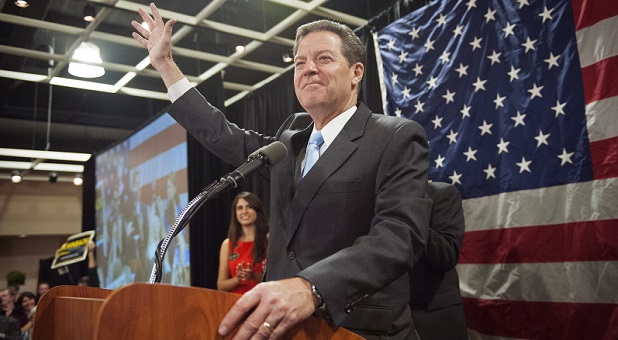Kansas Gov. Acts to Protect Religious Conscience Over Gay ‘Marriage’
In response to the Supreme Court’s ruling on the case of Obergefell v. Hodges, Governor Sam Brownback issued a new executive order to ensure religious freedom protections for Kansas clergy and religious organizations. In the majority opinion of Obergefell, Justice Anthony Kennedy wrote that, despite this newly invented “right” for same-sex couples to marry, religions and their adherents “may continue to advocate with utmost, sincere conviction that, by divine precepts, same-sex marriage should not be condoned,” and further, that “the First Amendment ensures that religious organizations and persons are given proper protection.” And yet, given the otherwise broad and blurry language of Kennedy’s opinion and the corresponding concerns of the dissenting justices, religious persons continue to worry. As Chief Justice John Roberts wrote: “People of faith can take no comfort in the treatment they receive from the majority today.”
Hard questions arise when people of faith exercise religion in ways that may be seen to conflict with the new right to same-sex marriage—when, for example, a religious college provides married student housing only to opposite-sex married couples, or a religious adoption agency declines to place children with same-sex married couples. Indeed, the Solicitor General candidly acknowledged that the tax exemptions of some religious institutions would be in question if they opposed same-sex marriage. See Tr. of Oral Arg. on Question 1, at 36–38. There is little doubt that these and similar questions will soon be before this Court. Unfortunately, people of faith can take no comfort in the treatment they receive from the majority today. Perhaps the most discouraging aspect of today’s decision is the extent to which the majority feels compelled to sully those on the other side of the debate. The majority offers a cursory assurance that it does not intend to disparage people who, as a matter of conscience, cannot accept samesex marriage. Ante, at 19. That disclaimer is hard to square with the very next sentence, in which the majority explains that “the necessary consequence” of laws codifying the traditional definition of marriage is to “demea[n] or stigmatiz[e]” same-sex couples. Ante, at 19. The majority reiterates such characterizations over and over. By the majority’s account, Americans who did nothing more than follow the understanding of marriage that has existed for our entire history—in particular, the tens of millions of people who voted to reaffirm their States’ enduring definition of marriage—have acted to “lock . . . out,” “disparage,” “disrespect and subordinate,” and inflict “[d]ignitary wounds” upon their gay and lesbian neighbors. Ante, at 17, 19, 22, 25. These apparent assaults on the character of fairminded people will have an effect, in society and in court. See post, at 6–7 (ALITO, J., dissenting). Moreover, they are entirely gratuitous. It is one thing for the majority to conclude that the Constitution protects a right to same-sex marriage; it is something else to portray everyone who does not share the majority’s “better informed understanding” as bigoted. Ante, at 19.
It is within this context that Gov. Brownback’s new Executive Order offers a first step toward what we might call “principled pluralism.” The meat of the order is as follows (or read the full thing):
NOW THEREFORE, pursuant to the authority vested in me as Governor of the State of Kansas, I hereby order and direct as follows: 1. General protection of the free exercise of religious beliefs and moral convictions The State Government is prohibited from taking any action inconsistent with the restrictions placed upon the State Government by the United States Constitution, or the Kansas Constitution, or the Kansas Preservation of Religious Freedom Act, against any individual clergy, religious leader, or religious organization on the basis that such person or organization believes or sincerely acts in accordance with a religious belief or moral conviction that marriage is or should be recognized as the union of one man and one woman. 2. Specific protections for persons and religious organizations (a) The State Government shall not take any discriminatory action against any individual clergy or religious leader on the basis that such individual declines or will decline to perform, solemnize, or facilitate any marriage, based upon or consistent with the individual’s sincerely held religious belief or moral conviction described in Section 1. (b) The State Government shall not take any discriminatory action against a religious organization, including those providing social services, wholly or partially on the basis that such organization declines or will decline to solemnize any marriage or to provide services, accommodations, facilities, goods, or privileges for a purpose related to the solemnization, formation, celebration or recognition of any marriage, based upon or consistent with a sincerely held religious belief or moral conviction described in Section 1. (c) The State Government shall not take any discriminatory action against a religious organization that provides social services or charitable services, which acts or intends to act upon sincerely held religious belief or moral conviction described in Section 1.
As Brownback summarizes: “The Kansas Bill of Rights affirms the right to worship according to ‘dictates of conscience’ and further protects against any infringement of that right. Today’s Executive Order protects Kansas clergy and religious organizations from being forced to participate in activities that violate their sincerely and deeply held beliefs.” The waters remain risky for people of faith, and this is but an initial local response to the latest state-imposed invention. But for those who seek true religious liberty in the new cultural landscape, it’s a promising development indeed. Reprinted from the Acton Institute.
















































